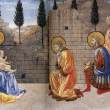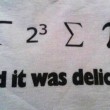Do the “Infancy Narratives” of Matthew and Luke Contradict Each Other?
by Tim Staples
Filed under Historicity, The Bible, The Incarnation

What do atheist skeptics and liberal Scripture scholars have in common? They both love to find alleged “contradictions” in Scripture. Though there are many of these alleged “contradictions,” one of the favorites of both of these camps is one that you can expect to find being re-hashed again and again on the Internet:—especially now that we are approaching Christmas—the “contradictions” found in what are commonly referred to as “the infancy narratives” of St. Matthew... Read More
How Richard Dawkins Helps Prove Biblical Inspiration
by Joe Heschmeyer
Filed under New Atheists, The Bible

American Atheists responded to the Pennsylvania state legislature’s designation of 2012 as “Year of the Bible” with mocking billboards, and a press release insisting that “the House of Representatives should not be celebrating a barbaric and Bronze Age book.” It’s a common argument against the Bible, that it can’t be trusted because it’s a book from the Bronze Age. Over on Twitter, Richard Dawkins extended this argument to attack both the Bible and the Qu’ran. Bible... Read More
The Bible and the Question of Miracles: Towards a Christian Response
by Dr. Matthew Ramage
Filed under The Bible

My previous post at Strange Notions underscored the often-unacknowledged philosophical premises at work when believers and non-believers sit down to debate about things biblical. In the course of my argument, I pointed to a possible area of common ground for Catholics and agnostics/atheists. A survey of statements by thinkers as different as Benedict XVI and Bart Ehrman reveals an important agreement upon the reality that everyone carries their own philosophical presuppositions and that... Read More
Does God Tempt People to Evil?
by Trent Horn
Filed under God's Nature

According to James 1:13, “Let no one say when he is tempted, 'I am tempted by God'; for God cannot be tempted with evil and he himself tempts no one.” Skeptics, aiming to disprove the Bible, may reply that God certainly does tempt people to do evil, and his actions during the Israelite's exodus from Egypt is proof of that. Let My People Go! In Exodus 3-4 God calls Moses from his life as a fugitive in Midian and tells him to return to Egypt in order to lead the Israelites to... Read More
Coming to Our Senses: The Moral Sense of Scripture

NOTE: Over the past several months, we've had lots of combox discussion about how Catholics read and interpret the Bible. To help us all make sense of this question, we began a multi-part series on the topic. Once a week, for the next several weeks, Mark Shea will unpack how Catholics authentically read the Bible. He began with a general introduction, then he outlined three specific guidelines. Last week he launched into the three main spiritual senses (or lenses) through which Catholics... Read More
Coming to our Senses: The Allegorical Sense

NOTE: Over the past several months, we've had lots of combox discussion about how Catholics read and interpret the Bible. To help us all make sense of this question, we began a multi-part series on the topic. Once a week, for the next several weeks, Mark Shea will unpack how Catholics authentically read the Bible. He began with a general introduction, then he outlined three specific guidelines. Today he'll begin covering the three main spiritual senses (or lenses) through which Catholics... Read More
Tools for Thinking Sensibly about Scripture

NOTE: Over the past several months, we've had lots of combox discussion about how Catholics read and interpret the Bible. To help us all make sense of this question, we began a multi-part series on the topic. Once a week, for the next several weeks, Mark Shea will unpack how Catholics authentically read the Bible. Last week he offered a general introduction, today he outlines three specific guidelines, and next week he'll begin covering the three main spiritual senses (or lenses) through... Read More
The Genesis Problem
by Bishop Robert Barron
Filed under The Bible

I’m continually amazed how often the “problem” of Genesis comes up in my interactions with people online. What I mean is the way people struggle with the seemingly bad science that is on display in the opening chapters of the first book of the Bible. How can anyone believe that God made the visible universe in six days, that all the species were created at the same time, that light existed before the sun and moon, etc., etc? How can Christians possibly square the naïve cosmology... Read More
The YouTube Heresies
by Bishop Robert Barron
Filed under Religion

A few years ago I began posting brief reflections on movies, music and culture on YouTube, probably the most watched Web site in the world. In my mind, this exercise resembles St. Paul's venture onto the Areopagus in Athens, preaching the Gospel amid a jumble of competing ideas. YouTube is a virtual Areopagus, where every viewpoint—from the sublime to the deeply disturbing—is on display. Never as a Catholic teacher or preacher have I addressed less of the "choir.” The most... Read More
Does the Bible Teach that Pi = 3?
by Trent Horn
Filed under The Bible

Every year on March 14 fans of math gather to enjoy a slice of pie along with discussions about pi, or the ratio of a circle’s circumference to its diameter. Since the value of pi is approximately 3.14, pi day is held on March 14 (or 3/14) each year. One objection to the Bible that pops up all over the Internet is the claim that the Bible teaches that Pi is actually three and not 3.14. In the first Book of Kings, Solomon selects Hiram to create a large, bronze basin of water for the... Read More






